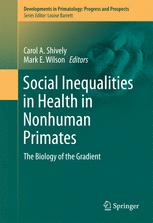

Most ebook files are in PDF format, so you can easily read them using various software such as Foxit Reader or directly on the Google Chrome browser.
Some ebook files are released by publishers in other formats such as .awz, .mobi, .epub, .fb2, etc. You may need to install specific software to read these formats on mobile/PC, such as Calibre.
Please read the tutorial at this link: https://ebookbell.com/faq
We offer FREE conversion to the popular formats you request; however, this may take some time. Therefore, right after payment, please email us, and we will try to provide the service as quickly as possible.
For some exceptional file formats or broken links (if any), please refrain from opening any disputes. Instead, email us first, and we will try to assist within a maximum of 6 hours.
EbookBell Team

5.0
50 reviewsThis book provides a comprehensive look at nonhuman primate social inequalities as models for health differences associated with socioeconomic status in humans. The benefit of the socially-housed monkey model is that it provides the complexity of hierarchical structure and rank affiliation, i.e. both negative and positive aspects of social status. At the same time, nonhuman primates are more amenable to controlled experiments and more invasive studies that can be used in human beings to examine the effects of low status on brain development, neuroendocrine function, immunity, and eating behavior. Because all of these biological and behavioral substrates form the underpinnings of human illness, and are likely shared among primates, the nonhuman primate model can significantly advance our understanding of the best interventions in humans.